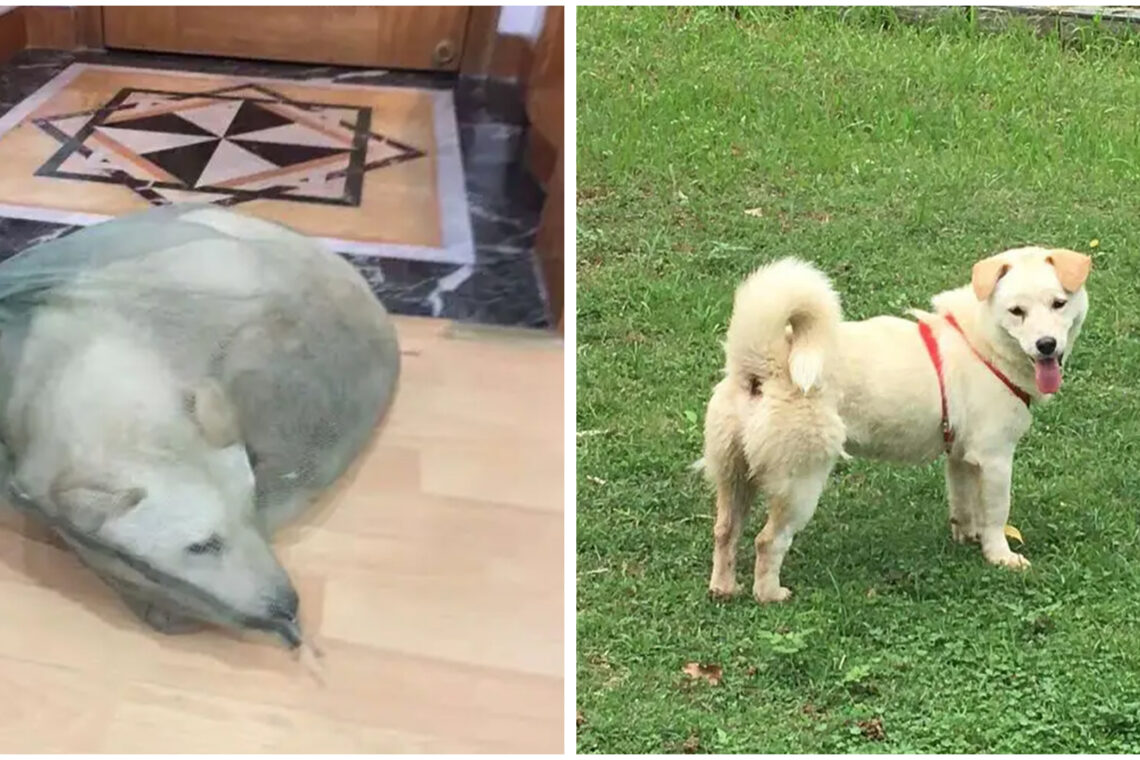
In parts of the world, some deeply troubling practices continue despite the tireless efforts of animal welfare groups to bring about change. One such practice is the selling of dogs for meat, which remains prevalent in certain areas of China. This country has earned the unfortunate distinction of being the largest consumer of dog meat globally, with an estimated 10 to 20 million dogs slaughtered for consumption every year.
During a visit to China, Singaporean resident Xingyi Danielle, accompanied by her father, encountered an extremely disturbing scene that would stay with her for a long time. While traveling, she came upon a group of men who were openly selling live dogs wrapped in bags, intended to be butchered for meat. Her father, upon witnessing this horrifying display, felt a deep sense of urgency to act. Unable to stand by while innocent creatures were subjected to such cruel treatment, he immediately intervened. Without hesitation, he paid a sum of $90 to rescue one of the dogs from its grim fate, determined to provide it with a chance at a better life.
However, Xingyi’s father faced a significant challenge. His apartment, unfortunately, did not allow dogs, which left him in a position where he had rescued this dog without any clear plan for what to do next. Nevertheless, his decision to act in the moment was driven by compassion, even though he had no idea what steps to take afterward. Reflecting on his actions, Xingyi spoke proudly of her father’s quick thinking and the courage he displayed when faced with such an agonizing choice.

“I was quite proud, to be honest,” Xingyi remarked. Despite the absence of a definitive plan for the dog’s future, her father’s instinctive decision to step in and save the animal was nothing short of commendable.
In the aftermath of rescuing the dog, Xingyi felt compelled to capture the situation in a photo. She was so shaken by the sight of the dogs being treated as mere commodities—bundled up in bags as though they were no more than meat—that she felt it was important to share her experience with others. She posted the photo online to raise awareness of the horrific reality faced by these animals, hoping to shed light on a practice that is still, tragically, a part of everyday life for many dogs in certain parts of China.
The dog that was saved, affectionately named Doggo, became an unexpected addition to her father’s life. Since the rescue, Doggo has been living in her father’s office, a temporary solution given the circumstances. Although it wasn’t the ideal living situation for a dog, her father did his best to create a safe and comfortable space for the animal. However, as is often the case with pets in confined spaces, Doggo’s playful nature and curious behavior have led to a bit of chaos around the office. “My dad’s colleagues are complaining about the mess Doggo is making,” said Xingyi, but she emphasized that despite the inconvenience, her father remains committed to giving Doggo the care and attention he deserves.
The situation is far from ideal, but both Xingyi and her father are actively working to find a more permanent and suitable home for Doggo. Their determination to provide him with a better life reflects the deep bond that can form between humans and animals, even in the most unexpected circumstances.

Although many people in China do not consume dog meat, millions of dogs across the country still face horrific conditions and are killed for their meat each year. The problem persists despite ongoing efforts to change attitudes and combat the practice. One of the most notorious events in China is the annual Lychee and Dog Meat Festival, where thousands of dogs are slaughtered, adding to the already staggering statistics of dog consumption in the country. The fact that such practices continue, despite growing public awareness and pressure from international animal rights organizations, highlights the complexity and deeply ingrained nature of the issue in certain regions.
While the story of Doggo’s rescue is a heartwarming example of individual action making a difference, it also serves as a reminder of the ongoing struggle to protect animals from cruelty. Even though Doggo’s life has taken a positive turn, there are still countless others who remain at risk, with no one to speak up for them. Stories like this highlight the need for continued advocacy and action to end the suffering of these animals. The challenge of changing a deeply rooted cultural practice requires not only the efforts of animal rights groups but also the support of individuals who are willing to stand up for those who cannot defend themselves.

At the very least, Doggo’s story serves as a small beacon of hope amid the grim reality that many animals in China continue to endure. Though he will never forget the trauma of his past, Doggo now knows safety and love, thanks to the kindness of strangers who refused to turn a blind eye. It is the compassion of people like Xingyi’s father that brings a glimmer of hope to those who are suffering in silence. By sharing stories like Doggo’s, it is possible to raise awareness, generate change, and inspire others to take action in the fight against animal cruelty.
Ultimately, the story of Doggo’s rescue not only celebrates the courage of a man who refused to ignore a suffering animal, but it also calls attention to the larger issue of dog meat consumption and the need for continued global awareness and action. As we reflect on stories like this, we are reminded that each small act of kindness can have a lasting impact, and that the fight for animal rights is a battle worth continuing—no matter how difficult the road may be.